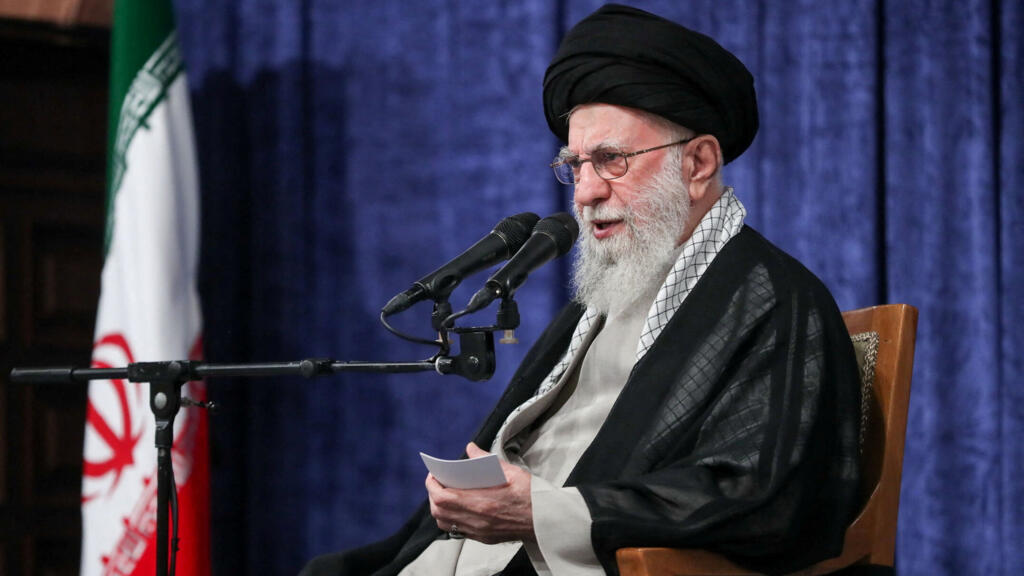Top Stories
Iran’s Khamenei Dismisses Direct US Talks on Nuclear Program

Iran’s supreme leader, Ayatollah Ali Khamenei, has firmly rejected the prospect of direct negotiations with the United States regarding the nation’s nuclear program. This declaration, made on September 26, 2023, signifies a significant setback in diplomatic efforts aimed at preventing the reimposition of United Nations (UN) sanctions on Tehran.
During a public address, Khamenei emphasized that engaging in direct talks with the US would not yield beneficial outcomes for Iran. His remarks come in the wake of escalating tensions surrounding Iran’s nuclear activities, which have drawn international scrutiny and concern. The absence of dialogue is perceived as closing off a potential avenue to mitigate the fallout of renewed sanctions that could adversely affect the Iranian economy.
Iran’s nuclear program has been a source of contention for years, with Western nations fearing that the country is seeking to develop nuclear weapons capabilities. In contrast, Tehran maintains that its nuclear ambitions are strictly for peaceful purposes, including energy generation. The ongoing standoff has prompted the US and its allies to pursue a series of sanctions intended to curb Iran’s nuclear advancements.
Khamenei’s dismissal of direct talks also reflects a broader strategy of resisting US influence in the region. He reaffirmed Iran’s commitment to its nuclear program while rejecting external pressures to abandon it. This stance is likely to be met with disappointment by those advocating for diplomatic solutions to the nuclear impasse.
The implications of Khamenei’s decision extend beyond Iran’s borders. Should UN sanctions be reinstated, the impact could reverberate throughout the region, affecting not only Iran but also its neighboring countries and global oil markets. Analysts warn that heightened sanctions could lead to further economic isolation for Iran, which is already grappling with severe economic challenges.
While Khamenei indicated that negotiations may occur under different circumstances, the current environment appears to remain unfriendly to diplomatic overtures. The US has previously expressed willingness to engage in discussions, contingent upon Iran’s commitment to curtailing its nuclear activities.
As the situation develops, the global community will be watching closely. The potential for renewed sanctions looms large, and the ramifications of Khamenei’s latest statements could shape the geopolitical landscape in the coming months.
In summary, the rejection of direct talks by Iran’s supreme leader underscores the deep-seated divisions between Tehran and Washington. With UN sanctions potentially on the horizon, the focus now shifts to how both sides will navigate this complex and increasingly fraught relationship.
-

 World5 months ago
World5 months agoSouth Korea’s Foreign Minister Cho Hyun to Visit China This Week
-

 Business5 months ago
Business5 months agoStarling Bank Plans Secondary Share Sale, Targeting $5.4 Billion Valuation
-

 Top Stories5 months ago
Top Stories5 months agoMunsang College Celebrates 100 Years with Grand Ceremony
-

 World5 months ago
World5 months agoPAS Aims to Expand Parliamentary Influence in Upcoming Election
-

 Business7 months ago
Business7 months agoKenvue Dismisses CEO Thibaut Mongon as Strategic Review Advances
-

 Lifestyle6 months ago
Lifestyle6 months agoHumanism Camp Engages 250 Youths in Summer Fest 2025
-

 Sports6 months ago
Sports6 months agoDe Minaur Triumphs at Washington Open After Thrilling Comeback
-

 Sports7 months ago
Sports7 months agoTupou and Daugunu Join First Nations Squad for Lions Clash
-

 Top Stories7 months ago
Top Stories7 months agoColombian Senator Miguel Uribe Shows Signs of Recovery After Attack
-

 World7 months ago
World7 months agoASEAN Gears Up for Historic Joint Meeting of Foreign and Economic Ministers
-

 Health6 months ago
Health6 months agoNew Study Challenges Assumptions About Aging and Inflammation
-

 Business7 months ago
Business7 months agoOil Prices Surge Following New EU Sanctions on Russia









